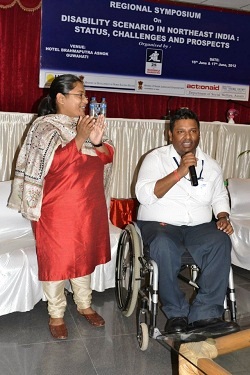Rituparna Choudhury was angry with her fourteen year old daughter, Nishita for missing the school bus. Unlike other occasions when she would have let loose a volley of harsh words, this morning, she controlled herself and said nothing. Nishita could barely suppress a grin at her mother’s unusually cool composure. As both mother and daughter rushed to the public bus stand to catch a bus to take her to school, Nishita wondered for how long her mother would remain like this before she became her normal self and started yelling at her for the slightest reason. An extremely house-proud person, Rituparna sometimes made life miserable for Nishita and her father Sandipan by her obsession with cleanliness. “Tip-top, tip top”, she would mumble as she brought herself to a tizzy, every day, dusting and wiping and moping each nook and corner of their house. She constantly fought with her husband over small issues. But yesterday, Rituparna and Sandipan had set aside all their bickering as they silently watched Nishita’s Kathak performance at the Rabindra Bhawan. It was her maiden public appearance since she had started learning Kathak three years ago. Her Guru from the Jaipur Gharana, selected for her a “tukda” with fast rhythm. Nishita gave her heart and soul to the performance. Her nimble foot work keeping pace with the rhythm of the recited passage made the ghungroos around her ankles emit at times soft, at times sharp sounds. She steadily raised the tempo of her dance with her whirling movements, climaxing into a fast visually exciting finish that brought the hall down. No sooner had her performance ended than Rituparna rushed backstage and embraced her daughter. “I am so proud of you”. She wept with happiness.
As they walked to the bus stand, Nishita could still feel her mother’s wet tears of the previous evening on her cheeks.
* * * * *
Bolen Das carefully counted the fresh, crisp five hundred rupee notes, secured them with a rubber band and shoved the bundle into the inside pocket of his jeans. He closed the door of his room, handed the key to his landlady and walked out of the compound towards the bus stand nearby. Yesterday evening, after a lot of wrangling, Ahmed the broker had come down to fifty thousand rupees from his original demand of seventy-five thousand rupees. Usually Ahmed’s terms were not negotiable but Bolen extracted the concession from him on the strength of their old friendship. The last five years had taken their toll on Bolen as he struggled hard to secure a permanent Government job. He had almost given up hope till he bumped into his old friend Ahmed, two weeks ago. Ahmed showed him the dark underbelly of the job market where brokers like him ruled the roost. When Bolen decided to utilize Ahmed’s services for a clerical job, it was out of sheer desperation. Today, as Bolen was on his way to hand Ahmed his money, he was at times, assailed by doubts on the broker’s honesty. What if he swindles me? he thought. His life’s savings earned working as a D.T.P. operator in private firms would be lost. On the other hand, Bolen had known Ahmed as a man of integrity during their college days. Is he still the same person today? he wondered. People changed with circumstances. Bolen reached the bus stand, confused and uncertain.
* * * * *
Rameswar Bhuyan was a changed man from the day his daughter, Debojani had given birth to a boy at a nursing home. A year ago, when Pranjit, his son-in-law had informed him about the birth of their son, Rameswar wept like a child. He was now a grandfather. Seven years ago, on another occasion Rameswar had wept tears of grief as he received the news that his only son, Pankaj, a jawan in the Assam Regiment had been killed in action at Kargil. From the time his son died till the day his grand son was born, Rameswar had lived a lonely life, lost in emptiness. Every morning, the sixty five year old widower and retired Post Master went for a walk in the park near his house. On his return, he bought a garland of marigold from a flower vendor and hung it on the framed portrait of his martyred son. The rest of the day, he stayed indoors, keeping to himself. His daughter Debojani, the only other person in the house, ministered to his needs. Two years ago, when Debojani got married, Rameswar further went inside his shell. He stopped his morning walks. The garland of marigold was delivered at his house by the flower vendor. His neighbors worried about him. Rameswar rarely interacted with them. He did his own cooking and washing. Debojani and Pranjit visited him every alternate day, bringing him his sparse requirements. Everything changed with the arrival of his grand son. Rameswar shed his old skin and became a new man. He moved around like someone possessed by a spell of exultation. His transformation was so abrupt and complete that his neighbors wondered if he had gone crazy. Rameswar became hyper active. He became sprightly and talkative. Everyday he visited his son-in-law’s house at the other end of the city, and in the evening on his way home, he recounted whoever he met with antics of his grand son. That morning as he hurried to the bus stand to catch a bus to his daughter’s house; his white dhoti billowing in the force of his rapid gait, his mind was on over drive, sifting through names beginning with the letter M. He had promised his daughter that he would bring one for his grand son … a fine name.
* * * * *
Tridip Mukherjee opened the closet in his bed room and sliding one hand over the rows of clean shirts on their hangers picked his favorite shirt – a white cotton garment with floral embroidered design. He chose a pair of beige corduroys to go with the shirt. He carefully placed the cloths on his bed and examined his freshly shaven face on the mirror.I am not bad looking, he thought running his fingers over the deep cleft on his chin. Today, he had taken leave from his office to meet Sharmista’s parents at their residence and seek her hands for him in marriage.
Two years ago Tridip Mukherjee had been transferred from Kolkata to Guwahati as a Sales Executive in a multinational electronics goods company. Initially, Tridip had been terribly home sick in Guwahati as he longed for the comforts of his home at Kolkata where he was born and had stayed all his life with his parents and two brothers. But as the days passed, he began to like the sights and sounds and smells of Guwahati. To his surprise, he discovered that a whole branch of his maternal family – the Moitras of Panbazar – were old residents of the city. From his newly discovered relatives, Tridip became friendly with a few persons and became a regular at their parties and family functions. At one occasion, he met a tall, soft spoken lady named Sharmista Roy. She was fair with long hair and brown eyes set in a large round face. She worked as a manager in a leading book stall of the city. Tridip and Sharmista shared a lot of things in common. They started going out together. Often Tridip took Sharmista on his bike to the Kharghuli Hillside near Raj Bhawan to watch the sunset over the Brahmaputra. He fell deeply in love with her. One evening as the sun dipped into the river in a burst of crimson Tridip confessed his feelings before her. She did not reply but gently placed her hand over his hand. He understood. Life took on a new meaning for both of them. As Tridip walked to the bus stand, he thought of Sharmista. She was the most beautiful woman in the world.
* * * * *
The blue bus slowed down and stopped in front of the bus stand. Inside, there were few passengers. Only one passenger, an old lady got down. This was one of the busiest stoppages on the route and the morning rush of commuters filled the bus to capacity in no time. The conductor blew his whistle. The driver shifted gears, eased the pedal and the bus slowly started to roll. About half a kilometer away, as it approached the busy intersection at Ganeshguri a large explosion shook the earth. A powerful bomb placed in an abandoned auto rickshaw near a garbage dump went off, hitting the bus with full impact.
Instantly, the bus caught fire and with a furious jerk of its engine spluttered to a halt on the middle of the road. There was smoke all around and the smell of burnt metal. For a few seconds, nobody inside the bus knew what hit them. When they realized what had happened, those with minor injuries rushed out of the bus. Those severely injured tried but could not move. Their cries of agony tore through the confusion. But five passengers, Rituparna and Nishita Goswami, Bolen Das, Rameswar Bhuyan and Tridip Mukherjee did not move at all. They lay still forever. The clock on the bus showed 9.16 am and stopped.







































